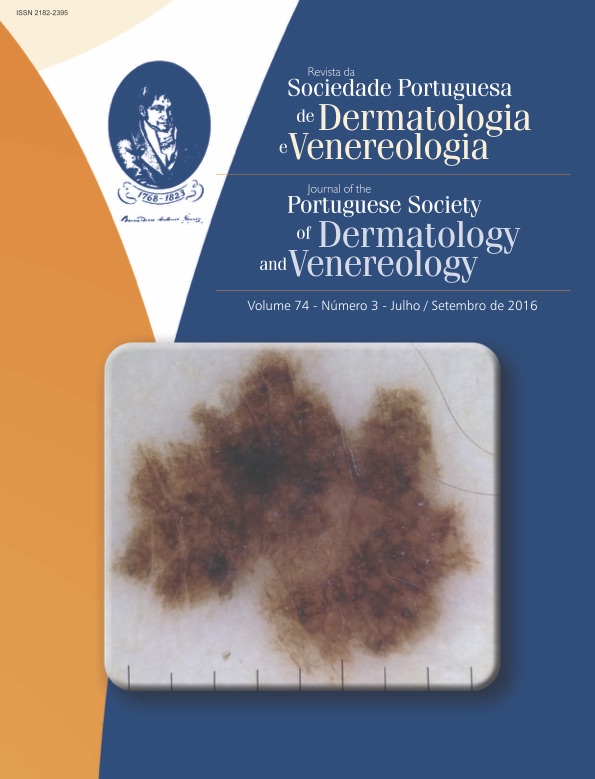E se também o Melanócito participasse na Fisiopatologia da Psoríase? E esta, hein?!
Resumo
.Downloads
Referências
Lowes MA, Suárez-Farinãs M, Krueger JG. Immunology of psoriasis. Annu Rev Immunol. 2014; 32:227-55.
Carvalho S, Torres T, Selores S. tratamento da psoríase com agentes biológicos: para além dos inibidores do
TNFα – o presente e o futuro. Rev Soc Port Dermatol Venereol. 2012; 70:299-310.
Gottlieb SL, Gilleaudeau P, Johnson R, Estes L, Woodworth TG, Gottlieb AB, et al. Response of psoriasis to a
lymphocyte-selective toxin (DAB389IL-2) suggests a primary immune, but not keratinocyte, pathogenic basis.
Nat Med. 1995; 1:442-7.
Schön MP, Broekaert SM, Erpenbeck L. Sexy again: The renaissance of neutrophils in psoriasis. Exp Dermatol.
(in press).
Mrowietz U. Neutrophils' sexiness is independent of trendy fashion. Exp Dermatol. 2016 (in press).
Kim J, Krueger JG. The immunopathogenesis of psoriasis. Dermatol Clin. 2015; 33:13-23.
Nair RP, Stuart PE, Nistor I, Hiremagalore R, Chia NV, Jenisch S, et al. Sequence and haplotype analysis supports HLA-C as the psoriasis susceptibility 1 gene. Am J Hum Genet. 2006; 78: 827-51.
Conrad, C, Boyman O, Tonel G, Tun-Kyi A, Laggner U, de Fougerolles A, et al. α1β1 integrin is crucial for accumulation of epidermal T cells and the development of psoriasis. Nat Med. 2007; 13:836-42.
Lande R, Botti E, Jandus C, Dojcinovic D, Fanelli G, Conrad C, et al. The antimicrobial peptide LL37 is a
T-cell autoantigen in psoriasis. Nat Commun. 2014; 5:5621.
Arakawa A, Siewert K, Stöhr J, Besgen P, Kim SM, Rühl G, et al. Melanocyte antigen triggers autoimmunity in
human psoriasis. J Exp Med. 2015; 212:2203-12.
Todos os artigos desta revista são de acesso aberto sob a licença internacional Creative Commons Attribution-NonCommercial 4.0 (CC BY-NC 4.0).








